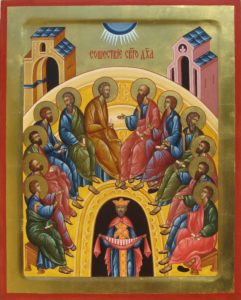The Nicene Creed: “And [we believe] in the Holy Ghost…”
**This post is part of a series reflecting on the Nicene Creed**
| << Previous post | View series |
|
“And [we believe] in the Holy Ghost, the Lord and Giver of life, who proceedeth from the Father, who with the Father and the Son together is worshiped and glorified.”
With the annunciation of the Holy Spirit the Nicene Creed completes its Trinitarian formulation. But to understand the role of the Spirit in the Trinity we have to look back into the creed. In doing so it will be come clear that the Holy Spirit isn’t a new phenomenon but an eternal participant with the Father and the Son in the creation, maintenance, and healing of the world. While this is important, what I will elucidate in this post is what the creed means when we recite that the Spirit is the giver of life. What we are not proclaiming is that the Spirit empowers the lives of individuals to transform the world. Instead, what we acknowledge is the magnificent way the Trinity works in the life of the church. It is only in and through the church, the we of the believe, that the redeeming power of the Holy Spirit enters into the world. (Eph. 3:10)
In the creed the Holy Spirit doesn’t appear out of nowhere. The Spirit is there in the incarnation of Christ, the Spirit is there in creation of the world (one God), the creed wants to make clear that the Spirit is active, united in one Godhead, throughout all history worshiped and glorified forever and ever, amen. It is in the proclamation of “We believe” (Πιστεύομεν (pisteuomen)/Credimus) that begins the creed where it is signified that the hope of union and concord that is inherent in all the fruits of the Spirit is possible in the church. The declaration of “We believe” sets aside the righteousness of the law that elevates the individual for the outpouring of the Spirit. It is only in the Spirit that the church can come together and be bound by the tongues of fire that pay no attention to language, or culture, or denomination.
The life of the Spirit is the life of the church. Therefore, when we declare in one voice that the Spirit is the “giver of life” we are not saying that it is the Spirit that breathes life into us when we are born. We are not saying that the Spirit is the moving force behind the creation of the world. We are not saying that the Spirit is the power of an individual proclaiming the gospel. We are saying that the Spirit gives life to the church, through which the gospel is proclaimed. We are saying the individual Christian is nothing outside of the church. We are saying the message of the gospel is nothing outside of the church.
It is not wise to separate the creed from the purpose of the councils of Nicaea and Constantinople: to unite the church and protect it from heresy. When our theology branches off from the Bible, and away from the protection of the tradition of the church, then the life provided by the Holy Spirit in the unity of the Trinity that we proclaim in the creed is snuffed out. This is not to say that the work of God is completely stifled when our divisiveness outmuscles our unity. The Trinity works and moves regardless of our errant ways. The power of the Spirit blows where it wills. It breathes life into the desiccated husk that protects the kernel, it heals the barren land, it is the power that restores and forgives, drawing the broken, the lame, and the ineffectual back into the life of the church, and it is through these, and not those who seek power and wealth—the weapons of discord—that God glorified. For it was through those who are diminutive, those whom the world saw as not worthy, the homeless prophets, the impecunious apostles, the young virgin who had no societal worth, that the church was born, and it is through those that are most open to the Spirit, the broken and those who recognize the impoverishment of their lives, that it will continue.
How then do we worship and glorify the Spirit? We proclaim the Father’s work in the world by pointing to the work of the Son who becomes incarnate not only in the historic person of Christ, but also in the continuing work of the Spirit in the life of the church. It is through the church that we participate in the eternal work of the Trinity, revealing the love of the Father, as seen in the life of the Son, through the Spirit empowering us to act out the life of Christ and to feed the world with the Spirit’s fruits of love, joy, peace, patience, kindness, goodness, gentleness, faithfulness, and self-control.
A.A. Grudem
Latest posts by A.A. Grudem (see all)
- How to be Thankful - September 12, 2016
- The Feast of Thanksgiving - August 12, 2016
- The Nicene Creed: “And [we believe] in the Holy Ghost…” - July 7, 2016

![The Nicene Creed: “And [we believe] in the Holy Ghost…”](http://manyhorizons.com/wp-content/uploads/et_temp/img_2982_0-241x300-50103_241x210.jpg)
